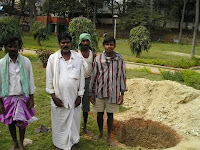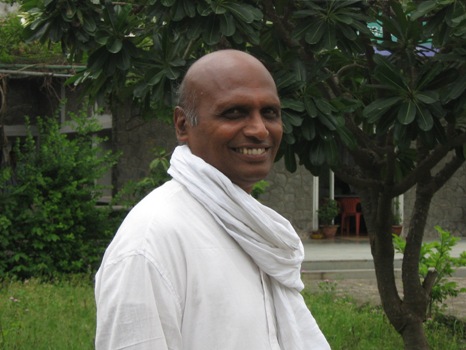/topics/governance
Governance
Internship Opp. at Arghyam
Posted on 24 Jul, 2009 10:31 AMArghyam’s Grants Team is inviting applications from dedicated and talented students for their internship programme. Positions are open for data analysis, water writing and documentation. Both these positions are for 2 months. Only Bangalore based candidates or candidates willing to relocate to Bangalore for the duration of this project need apply.
Notable new content: IELRC
Posted on 19 Jul, 2009 06:05 AM The International Environmental Law Research Centre (IELRC) (www.ielrc.org) is an independent, non-profit research organis
The International Environmental Law Research Centre (IELRC) (www.ielrc.org) is an independent, non-profit research organis
Tribute to Narendranath, an organic farmer who passed away in Hyderabad
Posted on 19 Jul, 2009 05:36 AMInternship positions at Arghyam
Posted on 18 Jul, 2009 07:38 AMArghyam's Grants Team is inviting applications from dedicated and talented students for their internship programme. Intern (Data and Analysis)
Rohini Nilekani: "A fine balance in Kutch"
Posted on 17 Jul, 2009 07:27 PMFrom Rohini Nilekani's "Uncommon Ground" column in Livemint
 As always, the monsoon may or may not come in time and in adequate quantity across the country. As always, again, people who live in the dry areas of the country, especially in the western desert districts of Rajasthan and Gujarat, with less than 250mm of average annual rainfall, will have to cope with scarcity, as they do year on year. Last week, I was in the Kutch region, on work, with soaring temperatures and no promise of rain despite an unusual cloud cover. We travelled a couple of hundred kilometres in the clay desert, despairing at the spread of Prosopis juliflora which—like so many other foreign species brought in by the forest department with all good intentions—has now overpowered large tracts of the countryscape, to the detriment of useful, hardy local species. We also marvelled at the raw beauty of the dry landscape, which yielded sudden delights such as a male nilgai in his prime and slender green bee-eaters diving gracefully in search of prey. Arid districts such as Kutch in Gujarat, and Barmer and Jaisalmer in Rajasthan mainly have livestock economies and it is not unusual to see thousands of animals—goats, cows, sheep, buffaloes and camels—moving amiably along in search of the next watering hole. It seems counter-intuitive that areas with such low rainfall should provide neighbouring states with meat and milk. IWMI (the International Water Management Institute) has done unique research to show how there is a massive export of virtual water from dry regions to wet through the sale of these products, leaving open some interesting questions on policy.
As always, the monsoon may or may not come in time and in adequate quantity across the country. As always, again, people who live in the dry areas of the country, especially in the western desert districts of Rajasthan and Gujarat, with less than 250mm of average annual rainfall, will have to cope with scarcity, as they do year on year. Last week, I was in the Kutch region, on work, with soaring temperatures and no promise of rain despite an unusual cloud cover. We travelled a couple of hundred kilometres in the clay desert, despairing at the spread of Prosopis juliflora which—like so many other foreign species brought in by the forest department with all good intentions—has now overpowered large tracts of the countryscape, to the detriment of useful, hardy local species. We also marvelled at the raw beauty of the dry landscape, which yielded sudden delights such as a male nilgai in his prime and slender green bee-eaters diving gracefully in search of prey. Arid districts such as Kutch in Gujarat, and Barmer and Jaisalmer in Rajasthan mainly have livestock economies and it is not unusual to see thousands of animals—goats, cows, sheep, buffaloes and camels—moving amiably along in search of the next watering hole. It seems counter-intuitive that areas with such low rainfall should provide neighbouring states with meat and milk. IWMI (the International Water Management Institute) has done unique research to show how there is a massive export of virtual water from dry regions to wet through the sale of these products, leaving open some interesting questions on policy.
The economics of climate change in Southeast Asia: a regional review
Posted on 13 Jul, 2009 09:53 AMClimate change will affect everyone but developing countries will be hit hardest, soonest and have the least capacity to respond. South East Asia is particularly vulnerable to the impacts of climate change with its extensive, heavily populated coastlines, large agricultural sectors and large sections of the population living under $2 or even $1 a day.
National Water Academy: Short-duration program for NGOs and media, 28 July 2009, Pune
Posted on 03 Jul, 2009 08:53 PM National Water Academy (Khadakwasla, Pune, India) will conduct a three day “Introductory Program” for NGOs and media persons active in water and environment sector, from 28 to 30 July 2009.
National Water Academy (Khadakwasla, Pune, India) will conduct a three day “Introductory Program” for NGOs and media persons active in water and environment sector, from 28 to 30 July 2009.
A moment for "He who fixes your pipe and She who cleans your home"
Posted on 22 Jun, 2009 11:41 AMImage and Content Courtesy: Avinash Krishnamurthy, BIOME Environmental Solutions Pvt. Ltd.,
Meet Muniyappa and his team of well diggers. They have dug over a 150 wells with us in the last two years and perhaps more than a 1000 wells in their life time. While digging Muniswamy (or someone else in the team) is drenched in sweat and is bare chested. He climbs up and down the well which can be upto 40 ft deep on footholds 2 inches deep that he himself digs into the sidewalls of the wells.  When he is deep down under, digging, and soil has to be hauled up, Srinivasu and Muniyappa are precariously perched on the side of the well pulling up the rope that holds the basket full of soil. And then once the well is dug, concrete rings (each weighing in the range of 75 Kg to 250 Kgs depending on the size of the well) are introduced down from the top with the help of the rope - and the sinews of Muniyappa, Srinivasu or Muniswamy. And during this process, Muniswamy virtually climbs in and out of the well for each ring that is introduced.
When he is deep down under, digging, and soil has to be hauled up, Srinivasu and Muniyappa are precariously perched on the side of the well pulling up the rope that holds the basket full of soil. And then once the well is dug, concrete rings (each weighing in the range of 75 Kg to 250 Kgs depending on the size of the well) are introduced down from the top with the help of the rope - and the sinews of Muniyappa, Srinivasu or Muniswamy. And during this process, Muniswamy virtually climbs in and out of the well for each ring that is introduced.
SANDRP : Press Release - Conflict of interest
Posted on 22 Jun, 2009 11:26 AMmmForwarded to the Portal by: Himanshu Thakkar, SANDRP 
PROJECT PROMOTER IS CHAIRING ENVIRONMENT CLEARANCE COMMITTEE LETTER SENT TO ENVIRONMENT MINISTER: TEST FOR UPA'S CLAIMS ON GOVERNANCE
For over two years now, Mr. P Abhraham who is on the Board of several hydropower and dam companies has been chairing the Ministry of Environment and Forests' Expert Appraisal Committee on River Valley and Hydropower projects. The committee, set up under the EIA Notification 2006 and EPA 1986, screens proposals for dams and hydropower projects for clearances at various stages. The committee also takes decisions on several very crucial policies governing the clearances for these projects. There is clear conflict of interest here between Abraham's role as director of companies and as this most crucial regulatory position in the Ministry of Environment and Forests. Over the past two years, there has been at least six occasions when a project of the companies where Abraham is a director has come for clearance before the committee he chairs. This is a completely unacceptable situation and a number of social and environment groups have written to the New Union Environment Minister to remove Abraham from this position, before the next meeting of the committee he chairs happens (it is scheduled for June 15-16, 2009).
Among many other power and dam companies, Abraham is on the Board of Lanco Infratech, GVK Industries Ltd, JSW Energy Ltd, PTC Ltd, Nagarjun Construction and Maharashtra Power Generation Company. Some of the projects from such companies that came up before the EAC that Abraham chairs over the last two years include the 3000 MW Demwe Hydropower project (Arunachal Pradesh), the 76 MW Phata Byung HEP (Uttarakhand), the 76 MW Rambara HEP (Uttarakhand), the 170 MW Bogudiyar-Sirkari Bhyol HEP (Uttarakhand), the 200 MW Mapang Bogudiyar HEP (Uttarakhand) and the 260 MW Kuther HEP (Himachal Pradesh). Abraham has been abstaining from the meetings whenever these projects came up before the EAC, but this is clearly not sufficient.







